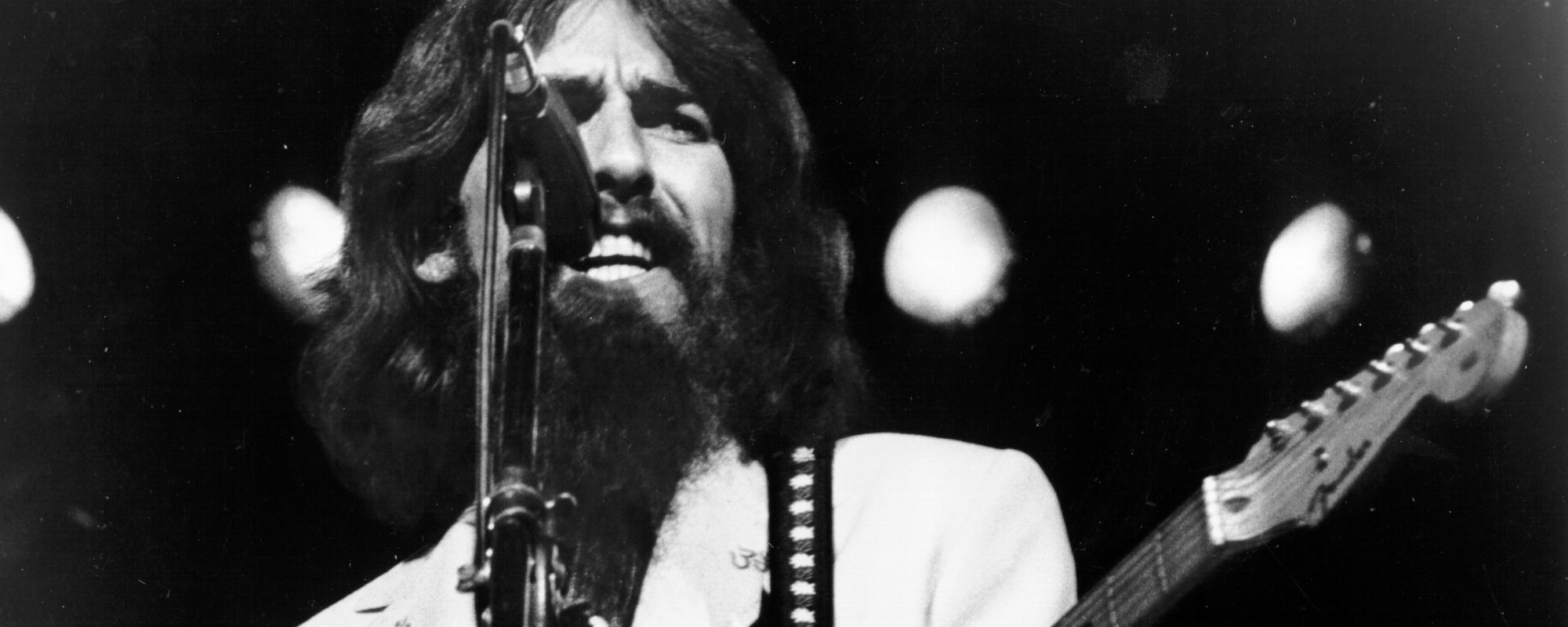George Harrison‘s masterpiece All Things Must Pass certainly didn’t skimp on the big hit singles. But what makes this 1970 triple album such a classic are the non-album tracks, which is where Harrison goes deep with his philosophical lyrics. With “Run of the Mill,” he dissected his relationships with the other members of The Beatles in the wake of the band’s dissolution.
Videos by American Songwriter
What is “Run of the Mill” about? Who is Harrison’s main target in the lyrics? And what brought him to the point of writing the song? To find the answers, let’s go back to when George Harrison was stepping away from The Beatles and cutting loose as a solo artist.
A Lot of “Things” to Say
Listening to All Things Must Pass now, it’s tempting to interpret many of the songs as Harrison’s reactions to The Beatles’ breakup. Songs like the title track and “Isn’t It a Pity” speak in bittersweet tones of endings, but were actually written before the band split for good. It’s just that Harrison’s cosmic musings had a way of thoughtfully addressing relationships coming together and breaking apart. As a result, these songs were almost prophetic.
But “Run of the Mill” was written specifically with The Beatles’ problems in mind. On the surface, it’s a measured exploration of a friendship once strong, now at the end of its tether. It’s a much more nuanced look at intra-Beatle relationships than what Paul McCartney and John Lennon were doing to each other with song grenades like “Too Many People” and “How Do You Sleep?”
In his book I, Me, Mine, Harrison talked about the origins of the song and the meaning of the title (which doesn’t appear in the lyrics):
“It’s like the North of England thing—you know, ‘Trouble at t’mill’: It was when Apple was getting crazy—Ringo [Starr] wanted it blue, John wanted it white, Paul wanted it green and I wanted it orange. Paul was falling out with us all and going around Apple offices saying ‘You’re no good’—everybody was just incompetent (the Spanish Inquisition sketch). It was that period – the problem of partnerships.”
The relationship between Harrison and McCartney was particularly frayed at the time. If you’ve seen the Get Back documentary, you’ll know Harrison became so frustrated at the micromanagement of his guitar playing at the hands of McCartney they fought on camera and Harrison briefly left the band.
On top of that, McCartney stood as the lone holdout against the other three Beatles, who wanted Allan Klein to manage the group’s affairs. But “Run of the Mill” doesn’t worry so much about business as it does about the status of a bond once so solid, now severing.
That vibe is amplified by the instrumental backing and song structure. Since there’s not really a chorus, “Run of the Mill” never really comes to much of a musical resolution, instead giving the feel of someone constantly searching for an answer that just won’t come. The horns provided by legendary session men Bobby Keys (saxophone) and Jim Price (trumpet) deliver a bluesy edge to the track.
What is the Meaning Behind “Run of the Mill”?
The narrator of “Run of the Mill” wants to rekindle a strained friendship, but he knows it takes two to tango. Thus, he presents his concerns with vulnerability and goodwill, in the hope this person will respond in kind. It’s you that decides is as close as the song comes to a refrain, which basically reminds this other person the ball is in their court.
Which way will you turn / While feeling that our love’s not our concern, Harrison sings, his hurt audible. The narrator is desperately trying to understand where things went wrong: As the days stand up on end / You’ve got me wondering how I lost your friendship / But I see it in your eyes. If the answers don’t come, a complete fracture might occur, with neither party any better for it: I may decide to / Get out with your blessing / Where I’ll carry on guessing.
The final verse is as close as Harrison gets to a warning about where this person is heading: Only you’ll arrive / At your own made end / With no one but yourself to be offended. The title of “Run of the Mill” suggests something routine, but the song is anything but. Instead, it’s a touching lament by George Harrison about how far apart the formerly tight-knit Beatles had strayed.
When you purchase through links on our site, we may earn an affiliate commission.
Photo by Steve Morley/Redferns/Getty Images












Leave a Reply
Only members can comment. Become a member. Already a member? Log in.